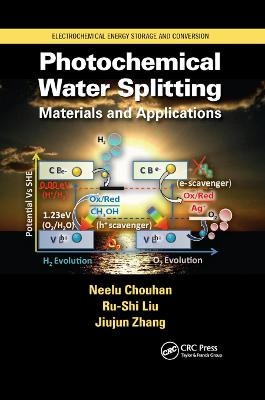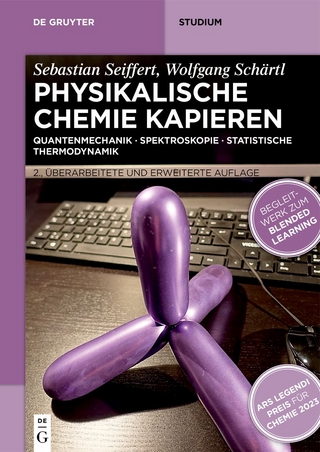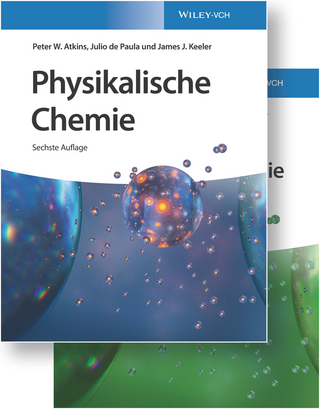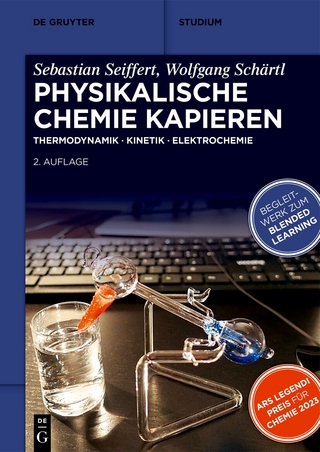
Photochemical Water Splitting
CRC Press (Verlag)
978-0-367-86991-5 (ISBN)
Cleavage of water to its constituents (i.e., hydrogen and oxygen) for production of hydrogen energy at an industrial scale is one of the "holy grails" of materials science. That can be done by utilizing the renewable energy resource i.e. sunlight and photocatalytic material. The sunlight and water are abundant and free of cost available at this planet. But the development of a stable, efficient and cost-effective photocatalytic material to split water is still a great challenge. To develop the effective materials for photocatalytic water splitting, various type of materials with different sizes and structures from nano to giant have been explored that includes metal oxides, metal chalcogenides, carbides, nitrides, phosphides, and so on. Fundamental concepts and state of art materials for the water splitting are also discussed to understand the phenomenon/mechanism behind the photoelectrochemical water splitting. This book gives a comprehensive overview and description of the manufacturing of photocatalytic materials and devices for water splitting by controlling the chemical composition, particle size, morphology, orientation and aspect ratios of the materials. The real technological breakthroughs in the development of the photoactive materials with considerable efficiency, are well conversed to bring out the practical aspects of the technique and its commercialization.
Dr. Neelu Chouhan is an Associate Professor and Head, Department of Pure and Applied Chemistry at the University of Kota (India). She received her B.Sc. degree in 1989 from MDS University, Ajmer (India), M.Sc. in 1991, M. Phil. in 1993 and B.Ed. in 1996. She obtained her Ph.D. degree on Organic Conducting Materials from M. L. S. University, Udaipur (India) in 2006. She worked at the SRD Modi College, Kota (1996-1998), and at the Govt. PG College, Bundi (1998-2012) as a Lecturer in Chemistry. She carried out two years postdoctoral research fellowship from 2008 to 2009 at the Department of Chemistry, National Taiwan University and worked on photocatalytic nano-materials for water splitting. Her research interests are organic superconductors, functional materials, nanomolecular devices and photochemistry of water splitting. She is the author or co-author of more than 30 publications in international scientific journals of high impact factor with good number of citations, contributed in 7 chapters and 3 books of national /international publications and has also been granted one international patent. Dr. Ru-Shi Liu is currently a Professor at the Department of Chemistry, National Taiwan University. He received his B.Sc in Chemistry from Shoochow University (Taiwan) in 1981, M.Sc in nuclear science from the National Tsing Hua University (Taiwan) in 1983, respectively. From 1983 to 1985, He worked at the Materials Research Laboratories, the Industrial Technology Research Institute (Taiwan). He obtained two Ph.D. degrees in chemistry – one from National Tsing Hua University in 1990 and the other from the University of Cambridge in 1992, separately. He was an Associate Professor at the Department of Chemistry of National Taiwan University from 1995 to 1999 before he was promoted to a full professor in 1999. He also serves as an adjunct Pearl Chair professor at National Taipei University of Technology since August 2014. His research is focused on the field o
Introduction to hydrogen as a green fuel. Concepts and definitions in photochemical water splitting. Water splitting technologies for hydrogen generation. Electrochemical water splitting. Oxide semiconductors (ZnO, TiO2, Fe2O3, WO3, etc) as photocatalysts for water splitting. Non oxide semiconductor materials for water splitting. Nanostructured semiconducting materials for water splitting. Giant sized materials for water splitting (supramolecular, dendrimers composite, etc). Fundamental understanding of the photocatalytic mechanisms. Photochemical cell designs, fabrication, performance, degradation, and diagnosis for efficient solar hydrogen production.
| Erscheinungsdatum | 23.12.2019 |
|---|---|
| Reihe/Serie | Electrochemical Energy Storage and Conversion |
| Verlagsort | London |
| Sprache | englisch |
| Maße | 156 x 234 mm |
| Gewicht | 453 g |
| Themenwelt | Naturwissenschaften ► Chemie ► Physikalische Chemie |
| ISBN-10 | 0-367-86991-8 / 0367869918 |
| ISBN-13 | 978-0-367-86991-5 / 9780367869915 |
| Zustand | Neuware |
| Haben Sie eine Frage zum Produkt? |
aus dem Bereich


